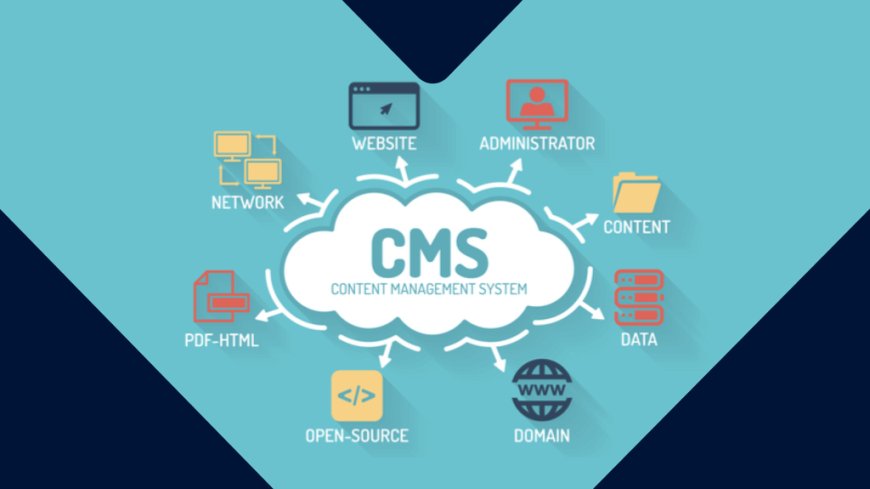How a CMS Can Optimize Your Website for Mobile Devices
Discover how using a CMS can enhance your website’s mobile performance. Learn the benefits of CMS for mobile optimization for your business.

In today's digital age, ensuring your website is optimized for mobile devices is crucial for reaching a broader audience and enhancing user experience. As mobile traffic continues to surge, leveraging a Content Management System (CMS) to optimize your website for mobile devices can significantly boost your business. This guide explores how a CMS can enhance your website's mobile performance and why it's essential for modern businesses.
Understanding the Importance of Mobile Optimization
Mobile optimization is the process of ensuring that visitors who access your website from mobile devices have an experience that’s optimized for their device. With the increasing use of smartphones and tablets for browsing and shopping, having a mobile-friendly site is no longer optional but a necessity.
Key Benefits of Mobile Optimization:
- Improved User Experience: Mobile-optimized websites offer a seamless experience, making it easier for users to navigate, read, and interact with your content.
- Higher Search Engine Rankings: Search engines like Google prioritize mobile-friendly websites in their rankings, making it crucial for visibility.
- Increased Engagement and Conversions: Users are more likely to stay on and engage with mobile-optimized websites, leading to higher conversion rates.
How a CMS Facilitates Mobile Optimization
A Content Management System (CMS für Website) provides tools and features that simplify the process of optimizing your website for mobile devices. Here’s how:
1. Responsive Design Integration
Most modern CMS platforms come with built-in responsive design features. Responsive design ensures that your website adapts to different screen sizes, providing a consistent user experience across all devices. With a CMS, you can easily implement responsive design templates that automatically adjust your content for mobile devices.
- Responsive Themes: Many CMS platforms offer a range of responsive themes that ensure your website looks good on any device.
- Mobile-First Design: Some CMS tools allow you to design your site with mobile users in mind first, ensuring a better experience on smartphones and tablets.
2. Mobile-Friendly Templates
A CMS often provides a library of mobile-friendly templates that are pre-designed to work seamlessly on mobile devices. These templates are optimized for touch screens and smaller displays, ensuring that your content is easy to read and interact with on any device.
- Customizable Templates: CMS platforms let you customize templates to match your brand while ensuring they remain mobile-friendly.
- Pre-Designed Layouts: Choose from various layouts specifically designed for mobile optimization to enhance user experience.
3. Content Management Tools
A CMS offers a variety of tools to manage and optimize content for mobile devices. This includes features for optimizing images, adjusting content layouts, and ensuring fast loading times.
- Image Optimization: CMS platforms often include tools for resizing and compressing images, reducing load times on mobile devices.
- Content Adjustment: Easily adjust text sizes, padding, and other elements to ensure your content displays correctly on smaller screens.
4. SEO Integration
A CMS often comes with integrated SEO tools that help improve your site’s search engine ranking. Mobile optimization is a key factor in SEO, and a CMS can help you implement best practices.
- Mobile SEO Plugins: Use plugins or built-in features to enhance your site's mobile SEO, including optimizing meta tags and descriptions for mobile users.
- Performance Analytics: Track mobile traffic and user behavior with built-in analytics tools, allowing you to make data-driven decisions.
5. User Experience Enhancements
A CMS provides features that enhance user experience on mobile devices, such as intuitive navigation and touch-friendly interfaces.
- Touchscreen Optimization: Ensure buttons and links are easily clickable on touch screens, improving user interaction.
- Navigation Improvements: Implement mobile-friendly navigation menus and buttons to enhance usability on smaller screens.

Choosing the Right CMS for Mobile Optimization
When selecting a CMS for your website, consider the following factors to ensure it meets your mobile optimization needs:
1. Responsive Design Capabilities
Ensure the CMS you choose supports responsive design and offers mobile-friendly templates. Look for platforms with a reputation for strong mobile performance.
2. Ease of Use
Choose a CMS that is user-friendly and allows easy management of mobile optimization features. The interface should be intuitive for making adjustments and updates.
3. Support and Updates
Opt for a CMS with regular updates and strong support to ensure it remains compatible with the latest mobile technologies and standards.
4. Customization Options
Select a CMS that offers customization options for mobile optimization, allowing you to tailor your site’s appearance and functionality to suit your needs.
Implementing Mobile Optimization Best Practices
Once you’ve chosen the right CMS, follow these best practices to ensure your website is optimized for mobile devices:
- Test Your Site Regularly: Use tools to test how your website appears on various mobile devices and make necessary adjustments.
- Optimize Load Times: Compress images and minimize code to reduce load times, improving user experience and search engine rankings.
- Monitor Analytics: Keep an eye on mobile traffic and user behavior to identify areas for improvement and adjust your strategy accordingly.
- Update Content: Regularly update your content and CMS to ensure it remains relevant and performs well on mobile devices.
Conclusion
Incorporating a CMS into your website management strategy is a powerful way to optimize your site for mobile devices. With features such as responsive design integration, mobile-friendly templates, and SEO tools, a CMS can help you deliver a seamless user experience across all devices. By choosing the right CMS and following best practices for mobile optimization, you can enhance user engagement, improve search engine rankings, and drive more conversions for your business.
What's Your Reaction?
 Like
0
Like
0
 Dislike
0
Dislike
0
 Love
0
Love
0
 Funny
0
Funny
0
 Angry
0
Angry
0
 Sad
0
Sad
0
 Wow
0
Wow
0





















































